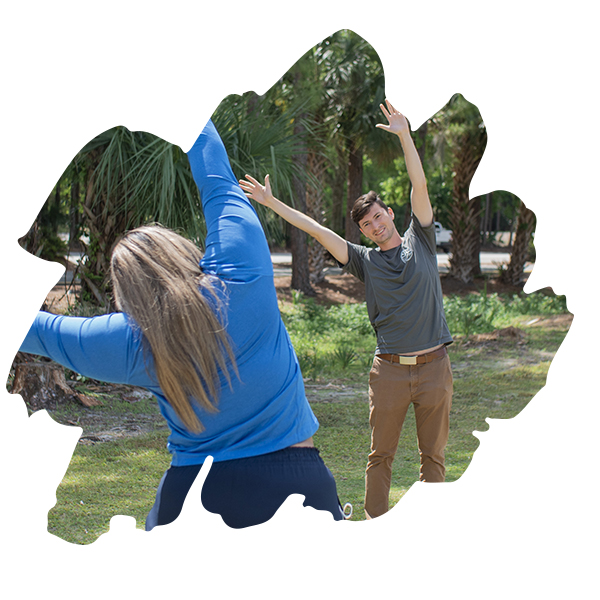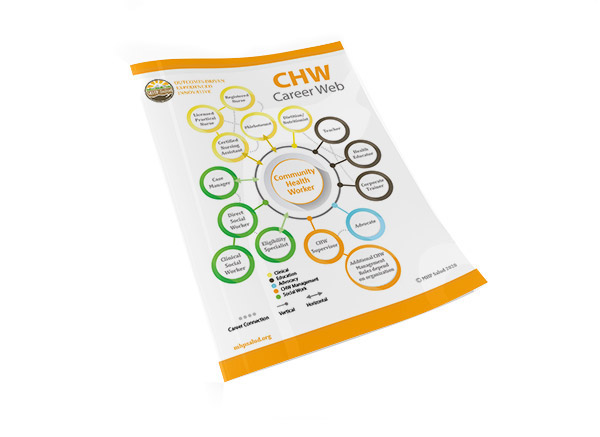We Serve Community Health Workers so they can empower their community.
Who are Community Health Workers?
A Community Health Worker (CHW) is a trusted member of the community who empowers their peers through education and connections to health and social resources. They have proven to be successful at increasing health outcomes for their communities because of their deep understanding of the cultural norms of the people they serve, as they are often members of the community themselves. They educate their peers about disease and injury prevention, work to make health services more accessible, and strengthen their communities to create positive change.
The Role of Community Health Workers
Over the years, the access and insight CHWs have into their communities has supported successful health initiatives across the globe. Their understanding of local culture, language, and resources allows them to be effective at addressing emerging health challenges in any geographic location of any cultural make-up and across various age groups. The variety of communities served means that CHW-led programs can look very different yet share the same common goal: to improve health outcomes in communities that are underserved and under-resourced.
In these communities, access to health services is often restricted due to factors such as economic status, language, race/ethnicity, gender, age, geographic location, access to transportation, and availability of culturally appropriate health information. These barriers impact one’s ability to find affordable fresh foods, keep appointments with health professionals, adopt healthier habits, and apply for health care and services.
CHWs empathize with these complex life situations and are uniquely qualified to provide support to address these challenges by connecting individuals to community resources, organizations, and government programs that often provide free or low-cost services.
Community Health Workers can also be referred to as:
- CHWs
- Promotores/Promotoras de Salud
Health Educators - Health Advocates
Lay Health Advisors - Outreach Workers
Community Health Representatives
The CHW Profession
The Community Health Worker profession has seen substantial growth in recent years because of CHWs’ ability to address the unique health and social issues within their communities. The Bureau of Labor Statistics reports that there are approximately 125,000 CHWs in the United States as of 2020, and the profession is expected to continue growing at a rate much faster than the national average of all other occupations over the next decade.1
Currently, most states in the U.S. have either enacted CHW legislation, started CHW associations, or work with CHWs. They can work with non-profits, community-based organizations, public health departments, and other organizations to help improve their community’s overall health.
Benefits of a CHW
With the appropriate resources, training, and support, CHWs provide a variety of social and economic benefits while improving the health of their communities. Through targeted outreach and customized programming, CHWs work to make community resources more accessible, connect their neighbors to health care and social services, and educate their peers about disease and injury prevention.
Where do CHWs work?
Community Health Worker programs are typically implemented in areas that are hard to reach because of geographic location, like the rural farms and colonias along the borders of Texas and California. These areas are sometimes known as food deserts because there are very few grocery stores that sell fresh and healthy foods. Additionally, hospitals and clinics are usually located far from these areas and are difficult to reach due to personal and public transportation challenges.
CHWs can also work within sections of the inner city that house small communities of individuals from similar cultural and economic backgrounds like New York City, Chicago, and Detroit. In these cities, CHWs may work to address several challenges such as sexual assault and domestic violence and provide bilingual health care application assistance for English language learners. They also assist community members with connecting individuals to low-cost or free services that are available at the local and federal level and to organizations that cover bus and train fares for those needing to travel to a medical appointment. CHWs also promote the consumption of fruits and vegetables by providing education around nutrition and healthy eating habits.
CHWs Are Uniquely Qualified
A Community Health Worker’s unique insight allows them to tailor their activities to address issues specific to the communities they serve in order to:
- Focus on serving the specific needs of ethnic and racial groups, underserved populations, and communities with pressing health problems
- Advocate for communities often overlooked because of economic or cultural differences
- Encourage individuals and families to adopt healthier eating habits and stay active
- Help individuals navigate and enroll in public assistance and health insurance programs
- Find and research new services and resources for community members
The Value of CHWs
CHWs can be integrated into care center teams to diversify the way organizations such as health centers, clinics, and hospitals reach individuals and improve their quality of services. Increased access to services and enhanced communication between clients and health providers leads to better adherence to health recommendations by providers and improved overall community health.
The inclusion of CHWs in health care has resulted in a decrease in costs for organizations and government programs while alleviating the rates of service utilization. This is due to the CHW’s ability to help people understand the health and social service system, reducing the need for emergency and specialty services. As the profession gains more national attention, programs are beginning to set salaries, offer stipends, or provide incentives to CHWs. This is proof of the value of their work to improve community health.
All CHWs who support MHP Salud programs are full-time employees receiving wages and benefits.
Positive Return on Investment
The integration of CHWs has proven to be cost-effective:
- Cada Paso del Camino, a cancer screening and education program, showed an ROI of $3.09 for every $1 spent2
- Year after year, participants of Vivir una Vida Plena, our CHW-led program for individuals at risk for chronic diabetic kidney disease (CDKD), demonstrated significant increases in physical activity and fruit and vegetable consumption and significant decreases in the consumption of sodium and sugary drinks. These lifestyle changes lessen an individual’s risk for CDKD and may lessen an individual’s need for medical treatment.
How to Become a CHW
In recent years, states have begun to develop training and credentialing requirements to become a Community Health Worker. Requirements vary across cities and states, employers, and employment sectors. Although CHWs are not licensed, some employers may set additional educational and training requirements. For example, while some employers require only a high school diploma, others can require a college degree. Additionally, CHWs need to be knowledgeable on community norms and should be able to speak the language of the population they serve.
Qualities of CHWs
When organizations seek CHWs they look for the following qualities:
- Relationship with the community being served
- Desire to help the community
- Empathy
- Persistence
- Creativity and resourcefulness
- Personal strength and courage
- Respectfulness
Skills of CHWs
According to the National Community Health Advisor Study, CHWs are more effective in their work when they have the following skills:
- Communication skills
- Interpersonal skills
- Teaching skills
- Service coordination skills
- Advocacy skills
- Capacity-building skills
Health Topics Addressed
- Chronic diseases like asthma, hypertension, diabetes, cancer
- Immunizations, maternal and child health and HIV/AIDs
- Substance abuse, mental and behavioral health
- Prenatal care, childbirth and postpartum support
- Domestic violence, intimate partner violence
- Financial literacy
- Access to health insurance, health care, doctor care, government programs, application assistance
- Nutrition, access to healthy/fresh affordable food
- Physical fitness and activity in community members’ surrounding area
How to Start or Strengthen a Community Health Worker Program
Over the years, MHP Salud has developed multiple CHW programs that successfully address a variety of health topics and positively impact health outcomes of our communities. This includes practical guidance and education that influences chronic disease outcomes, like healthy eating, physical activity, and timely disease screening. The programs also yield financial benefits, finding a positive return-on-investment (ROI) of $1.09-3.16 for every $1 invested.
We have taken the information from our many innovative outcomes-driven programs to develop training and consulting to help organizations start or maintain CHW programs. To learn more about our products and support for your organization, please visit CHW Training and Consulting.
Are you looking to start a CHW program or have already begun one? Click here for our resources and tips!
-
- https://www.bls.gov/ooh/community-and-social-service/health-educators.htm
- https://mhpsalud.org/programs/community-health-workers-roi/




